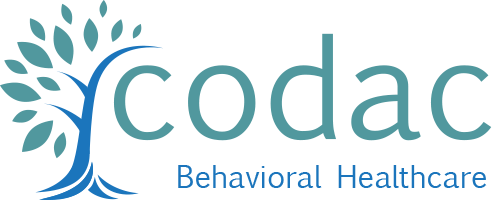Published in Providence Business News
June 25, 2023
By PBN Staff
David Nefussy was hired as CODAC Behavioral Healthcare’s chief business officer in May. He had previously worked at Spectrum Health Systems in Worcester, Mass., since 2017. He served as Spectrum Health’s vice president of payer relations, responsible for crafting agreements and negotiating reimbursement with insurance companies, managed care organizations and other third-party payers. He spoke about what he’ll be doing for Providence-based CODAC, the largest nonprofit, outpatient provider for opioid treatment in Rhode Island.

PBN: What about CODAC attracted you to this job?
NEFUSSY: After working in the insurance industry for over 25 years and at a Massachusetts substance use provider for the past five-plus years, I accepted a role with CODAC Behavioral Healthcare. I was immediately attracted to the various innovations Linda Hurley, CEO, and staff have done. CODAC was the first in offering a mobile van to improve access to individuals seeking substance use disorder treatment. This changed the normal protocol where clients would go to a brick-and-mortar site – in this scenario CODAC came closer to you, treating clients who may be homeless or located in underserved areas. Additionally, the medication assisted treatment provided is for all three approved treatment protocols (methadone, buprenorphine and naltrexone).
Similarly, CODAC is seeking to provide assistance in partnership with Project Weber/RENEW with the first “safe [harm] reduction site” in Rhode Island. This is designed to provide a safe space for people struggling with addiction to inject illegal drugs under the supervision of medical professionals.
Most importantly, they reduce overdose deaths in the neighborhood where they are located. These centers reduce drug use in public spaces, reduce drug paraphernalia litter and decrease public disturbances. It is important to highlight that they do not increase crime in the surrounding neighborhoods. In short, this initiative provides respect, dignity and compassion to a population that is repeatedly stigmatized. Ongoing out-of-the-box ideas [such as] this was key in my making this professional change.
PBN: Some people might think that “chief business officer” sounds too profit-minded for a nonprofit organization. As a CBO, what will you do at CODAC?
NEFUSSY: Part of my role as implied by your inquiry is correct. I will be responsible for negotiating third-party payer pricing and contract terms to ensure favorable partnership structures.
Additionally, I will work with the payers in developing joint ventures or collaborative relationships to improve the outcomes of the clientele. In fact, CODAC will be working with Optum on [an] … emergency department pilot project in the near future to improve access and engagement of members with opioid use disorder in the ED, initiate and refer to medication assisted treatment buprenorphine, and then provide next-day referral to a community treatment partner.
CODAC will be the partner that will provide the ongoing medication assisted treatment, in conjunction with applicable therapy (individual, family and group counseling) as warranted. The three Rhode Island hospitals anticipated to participate in this initiative include Lady of Fatima Hospital, Kent County Memorial Hospital and Roger Williams Medical Center.
PBN: How is what you do important to a CODAC client seeking opioid treatment? Or does it not have a direct effect on that part of CODAC’s mission?
NEFUSSY: My role, although I would not use the word “critical,” is an essential piece of the puzzle that helps generate either new relationships with payers … or enhance existing partnerships that provide new opportunities to improve access to services, but more importantly develop initiatives that improve outcomes. In short, keep clients engaged in treatment. One such concept is digital therapeutics.
Digital therapeutics are evidence-based therapeutic interventions driven by high-quality software programs to prevent, manage or treat a medical or behavioral disorder or disease. This is a modern tool that may improve clients staying engaged in treatment. One such player is DynamiCare. DynamiCare uses an approach called contingency management that rewards clients in treatment with money and prizes for maintaining abstinence. This is a program I helped in implementing at my previous organization. In Rhode Island, it appears the goal of this program will be for all clients in substance use treatment, although discussions are ongoing.
PBN: From what I’ve read, you’ve put emphasis on innovation in your previous positions. How will that be applied to your role at CODAC?
NEFUSSY: In addition [to the answer above], I see myself working with Linda Hurley, CEO, and other CODAC C-suite staff in looking to identify any other creative concept or program that will improve engagement with clients in treatment, but even more importantly assist in maintaining their recovery.
Likewise, as an individual who worked in the insurance industry for over 25 years, I want to enhance the partnerships CODAC has with the various payers to improve medical behavioral integration. Unfortunately, for too long, behavioral health and medical services have been separate, with little or no coordination of care. Medical behavioral integration blends care in one setting for medical conditions and related behavioral health factors that affect health and well-being.
Integrated behavioral health care, a part of “whole-person care,” is a rapidly emerging shift in the practice of high-quality health care. It is a core function of the “advanced patient-centered medical home.” As defined by the Agency for Healthcare Research and Quality, “providers practicing integrated behavioral health care recognize that both medical and behavioral health factors are important parts of a person’s overall health. Medical and behavioral health clinicians work together as a team to address a patient’s concerns. Care is delivered by these integrated teams in the primary care setting unless patients request or require specialty services. The advantage is better coordination and communication, while working toward one set of overall health goals.”
The ER initiative is a small part of this integration. Over the next several years, I would like to have CODAC be an active member at the table with various large medical providers, accountable care organizations and hospitals to assist in the “total care” of the client and eliminate the siloing of behavioral health.
PBN: What are some of the challenges you’ll face as the chief business officer?
NEFUSSY: The biggest challenges I see impacting me, as well as all CODAC and other behavioral health providers, is the ongoing stigma that is still relevant today. Although, I must admit stigma in the New England states, and in particular Massachusetts, Rhode Island and New Hampshire, are minimal around substance use; however, it still does exist.
It is also imperative that in order to be able to recruit and maintain appropriately licensed staff to treat the substance use disorder population, Rhode Island Medicaid relook at the current reimbursement methodology. The state, based on recent data provided by Milliman, notes behavioral reimbursement for most substance use disorder services ranges from 4% to 50% lower as compared with other New England states utilizing a similar reimbursement protocol.
Also, I feel it is imperative, the state of Rhode Island be aware as of Jan. 1, 2023, Massachusetts Medicaid and Massachusetts Medicaid managed care organizations changed their payment process to align with Medicare, utilizing bundled rates and “G codes.” This has significantly boosted the reimbursement for medication assisted treatment services. This has a positive impact on Massachusetts providers of substance use disorder services as they now have the financial resources to maintain and recruit additional qualified licensed staff to provide these badly needed services.
However, it places CODAC and other similar Rhode Island programs at a huge disadvantage in both maintaining existing staff, as well as recruiting new staff – Rhode Island opioid treatment programs and clinics cannot compete with agencies offering similar programs across the state lines due to the significant reimbursement differential. Qualified staff are likely to be lured by Massachusetts providers due to the enhanced compensation they can provide.
In these demanding times in the deliverance of quality services to this challenging population, it is likely the state is greatly underestimating the huge staffing issues facing programs [such as] ours.


Recent Comments